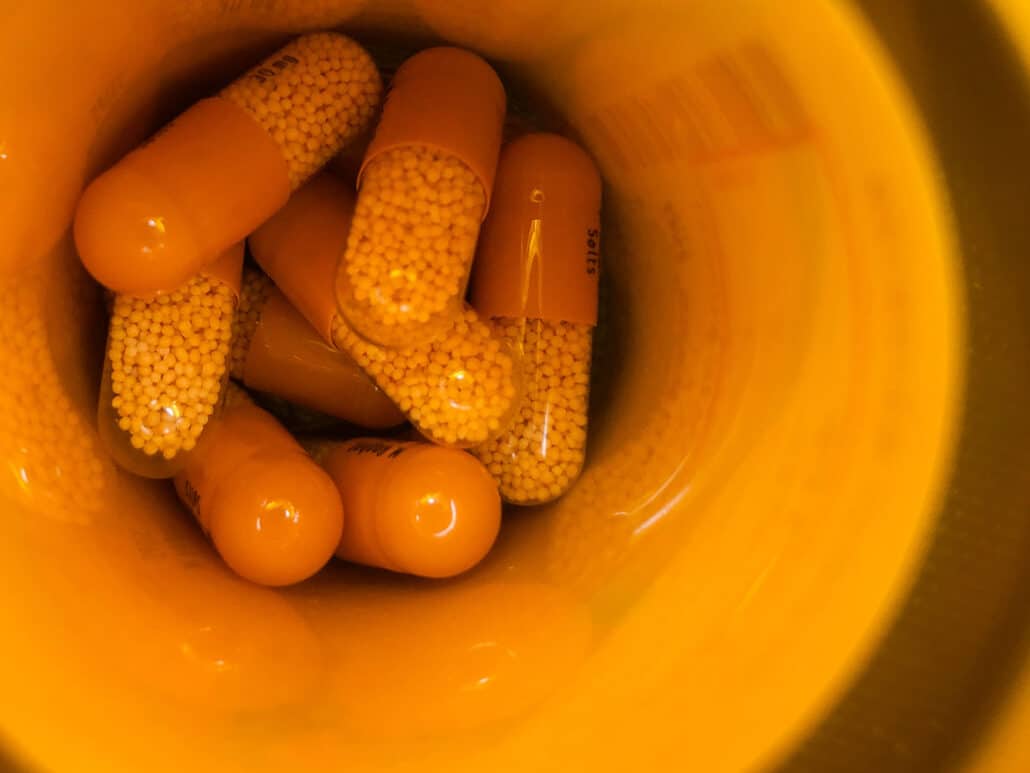Adderall is a prescription medication primarily used for ADHD and narcolepsy. The “ideal” usage of that drug is by consuming the tablet as instructed.
However, it has been misused in the sniffing form, which, despite boosting its effects, can lead to serious (sometimes fatal) complications.
In this guide, we’ll tell you what happens when you snort Adderall and how you can overcome its addiction.

Table of Contents
What Is Adderall?
Adderall is a Schedule II controlled substance approved for managing ADHD and narcolepsy.
Its active ingredients, amphetamine and dextroamphetamine, stimulate the central nervous system (CNS) by increasing dopamine and norepinephrine levels, enhancing focus and alertness.
When prescribed by a doctor, Adderall comes in tablet form, available as immediate-release or extended-release (Adderall XR) versions.
The prescription drug works by increasing levels of dopamine and norepinephrine in the central nervous system, helping people with ADHD focus better and control impulsive behaviors.
For individuals with legitimate prescriptions, Adderall can significantly improve daily functioning, academic performance, and overall quality of life.
However, its stimulant properties have led to widespread misuse, particularly among college students and young adults looking for enhanced concentration, prolonged energy, or euphoric effects.
What Happens When You Snort Adderall?
In addition to the quick effect, people snort Adderall because of that “kick” it provides. They crush the tablets into a fine powder and inhale them through the nose.
This method of consumption bypasses the digestive system, allowing the drug to enter the bloodstream directly through the nasal tissues.
Because of that, the effects begin much faster than when the medication is taken orally, often within 5-10 minutes instead of the 30-60 minutes with normal use.
Physically, when someone snorts Adderall, the powdered medication adheres to the moist tissues inside the nose. The drug quickly passes through the nasal mucosa into nearby blood vessels, creating a direct path to the brain.
This rapid delivery floods the central nervous system with stimulants, causing an intense surge of dopamine and other neurotransmitters.
This process fundamentally alters how the medication affects the body, dramatically increasing risks compared to oral consumption.
The natural filtering processes that occur during digestion are circumvented, making overdose and serious side effects much more likely.

The Dangers of Snorting Adderall
The effects of snorting Adderall extend far beyond the intended therapeutic benefits of the medication.
This method of administration creates numerous health risks that can damage multiple body systems and lead to serious, sometimes permanent complications.
1. Respiratory System Damage
Snorting Adderall causes direct trauma to the delicate nasal passages. Regular use typically leads to chronic inflammation of the nasal tissues and frequent nosebleeds from damaged blood vessels.
Users often develop sinus infections that become increasingly difficult to treat with antibiotics over time.
The most concerning respiratory damage involves perforation of the nasal septum (the wall dividing your nostrils), which can occur after extended periods of snorting.
Many long-term users report a permanently reduced sense of smell along with a chronic runny nose or congestion that doesn’t respond to typical treatments.
The powder form of crushed tablets also contains fillers and binders not meant for inhalation. These substances accumulate in the respiratory tract, potentially causing long-term breathing problems that persist even after stopping Adderall use.
2. Increased Overdose Risk
The risk of overdose rises dramatically when Adderall is snorted. Without the gradual absorption provided by oral ingestion, dangerous amounts of the stimulant can flood your system at once.
Adderall overdose presents with extreme agitation or panic, dangerously high body temperature, and rapid, irregular heartbeat. In severe cases, users experience seizures, hallucinations, confusion, and even loss of consciousness.
An Adderall overdose requires immediate emergency medical attention. Without prompt treatment, permanent brain damage can occur from oxygen deprivation during seizures or from the effects of sustained high body temperature.
Unfortunately, some overdose cases result in death, particularly when the person has underlying cardiovascular weaknesses or combines Adderall with other substances.
3. Cardiovascular Issues
Snorting Adderall places extreme stress on the cardiovascular system. The rapid spike in stimulant levels causes severe spikes in blood pressure and heart rate abnormalities that can trigger serious events.
Blood vessels throughout the body constrict sharply, reducing blood flow to essential organs and increasing stroke risk substantially.
Heart attacks become a genuine concern, especially in people with pre-existing heart conditions, though they can occur even in young users with no prior heart issues.
The repeated stress damages heart muscle tissue over time, leading to weakened cardiac function. Many users develop an irregular heartbeat (arrhythmia) that persists even when not using the drug, indicating lasting damage to the heart’s electrical system.

4. Neurological Problems
The brain is another organ that faces a significant impact from snorted Adderall. Seizures can occur from overstimulation of the central nervous system, sometimes developing into a seizure disorder that continues after quitting the drug.
Severe headaches are also frequent, becoming chronic with continued use and resistant to typical pain medications.
Plus, prolonged exposure to abnormally high levels of neurotransmitters causes changes in brain chemistry that affect mood regulation for months or years.
Some users develop movement disorders similar to those seen in Parkinson’s disease. Research suggests potential for permanent brain damage with long-term abuse, particularly affecting memory and executive function.
Cognitive impairment may persist long after stopping use, with some former users never regaining their previous mental clarity.
5. Psychological Effects
Mental health suffers greatly from snorting Adderall. Users commonly develop anxiety that can become crippling, interfering with daily functioning.
Paranoia sometimes becomes severe enough to mimic psychosis, causing users to become suspicious of friends and family.
Hallucinations emerge in some cases, especially with heavy use or during binges when users take multiple doses without sleeping.
All of that can cause sleep disturbances, which can wreak havoc on mental functioning and emotional stability. Mood swings intensify with continued use, making relationships difficult to maintain.
Users also have to worry about depression, which occurs both during use and particularly during withdrawal, sometimes reaching suicidal levels.
Perhaps most alarming is the risk of drug-induced psychosis with prolonged heavy use. This condition can resemble schizophrenia and occasionally requires hospitalization, sometimes not resolving completely even after the person stops using Adderall.
6. Increased Risk of Addiction
Despite not being an opioid, snorting Adderall significantly increases addiction potential compared to oral use.
The intense, rapid high creates stronger reinforcement patterns in the brain’s reward system. Users develop tolerance faster than with oral consumption, requiring increasingly larger doses to achieve the same effects.
Withdrawal symptoms become more severe with this method of use, driving continued consumption to avoid discomfort.
Psychological dependence develops quickly, with users feeling unable to function normally without the drug. Cravings increase in intensity and frequency, occupying more of the person’s thoughts.
As a result, drug-seeking behavior becomes more compulsive, often leading users to prioritize obtaining Adderall over important responsibilities.
Many people who start by snorting Adderall show a higher likelihood of progressing to other substance abuse, including methamphetamine, which produces similar but stronger effects.
7. Serotonin Syndrome (in overdose)
In cases of significant overdose, particularly when Adderall is combined with other substances that affect serotonin levels, serotonin syndrome becomes a life-threatening concern.
This condition presents with dangerously high body temperature that can damage organs if not quickly addressed.
The extreme agitation and confusion make medical treatment challenging as patients may resist help. Muscle rigidity and tremors progress to seizures in severe cases.
Without proper medical intervention, organ failure can occur rapidly, particularly affecting the kidneys as they attempt to process the drug while dealing with extremely elevated body temperature.
Note: This condition requires emergency hospitalization and intensive medical management. Even with prompt treatment, some patients experience lasting effects from the episode.
8. Other Physical Side Effects
Snorting Adderall causes numerous other health problems beyond the major systems already discussed, including but not limited to:
- Severe dry mouth leads to dental issues, including tooth decay and gum disease.
- Malnutrition commonly results from the suppressed appetite effect, which is intensified when the drug is snorted.
- Excessive weight loss that can reach dangerous levels, particularly in users who already had a low body weight before starting Adderall.
- Skin problems, including rashes and acne, often develop, partly due to hormonal changes and partly from poor nutrition.
- Muscle tension and cramping become chronic issues for many users.
- Vision changes sometimes occur, with some people reporting blurred vision or difficulty focusing their eyes.
- Gastrointestinal distress that manifests as stomach pain, constipation, or diarrhea.
- Disrupted sleep patterns that extend beyond simple insomnia to include complete reversal of normal sleep-wake cycles in heavy users.

Adderall Abuse Treatment
Overcoming an addiction to Adderall requires a structured, compassionate approach that addresses both physical dependence and psychological triggers.
Here is our evidence-based approach that we use in our treatment programs offered by Long Island Interventions.
Step 1: Medical Detox
Medical detox is the first critical phase, ensuring safety during withdrawal. Adderall’s impact on dopamine levels means abrupt cessation can trigger severe fatigue, depression, and cravings.
Under excellent medical supervision, doses are gradually tapered to minimize discomfort. Our clinicians may prescribe non-stimulant medications to stabilize mood and sleep patterns.
For example, antidepressants or short-term sleep aids help manage co-occurring mental health issues like anxiety.
The detox process typically lasts 5–7 days, with 24/7 monitoring to prevent complications like cardiac stress or relapse (going back to drug abuse).
Step 2: Behavioral Therapy
Once detox is complete, behavioral therapy tackles the root cause of the drug addiction. Cognitive-behavioral therapy (CBT) helps individuals recognize triggers, such as academic pressure or social environments, and replace destructive habits with healthy coping strategies.
We also utilize group therapy sessions to provide peer support, reducing the isolation often felt by struggling individuals. Family therapy may also be incorporated to repair relationships damaged by addiction.
Step 3: Dual Diagnosis Treatment
Many individuals with Adderall addiction struggle with undiagnosed mental health disorders, such as ADHD, depression, and attention deficit hyperactivity disorder.
Our dual diagnosis programs simultaneously treat addiction and underlying conditions to prevent the high potential of relapse.
For instance, non-stimulant medications like atomoxetine may manage ADHD symptoms without the risks of amphetamine-based drugs.
Therapy sessions focus on rebuilding emotional resilience and addressing trauma that may drive uncontrolled drug use.
Step 4: Aftercare Planning
Sustainable recovery hinges on ongoing support. Long Island Interventions designs personalized aftercare plans, which often include:
- Outpatient programs: Flexible intensive outpatient sessions allow individuals to maintain work or school commitments outside the addiction treatment center while attending therapy.
- Support groups: Peer-led groups like SMART Recovery provide accountability and shared experiences.
- Lifestyle adjustments: Nutrition counseling, exercise routines, and stress-management techniques (e.g., mindfulness) help restore physical and mental health.

How Long Island Interventions Can Help With Adderall Addiction Treatment
At Long Island Interventions, we offer tailored treatment options for any substance use disorder, prioritizing individualized care. Our approach includes:
- Comprehensive assessments to identify co-occurring disorders and customize treatment.
- Insurance coverage coordination, ensuring access to detox, inpatient, or outpatient program options without financial barriers.
- Family involvement through counseling and education, fostering a supportive home environment.
- Relapse prevention training, equipping clients with tools to navigate triggers like academic stress or social pressure.
Don’t let addiction get in the way of your or your loved one’s well-being. If you feel that all doors have closed, contact us today. Let us help you recover your life.
Published on: 2025-04-26
Updated on: 2025-04-28

